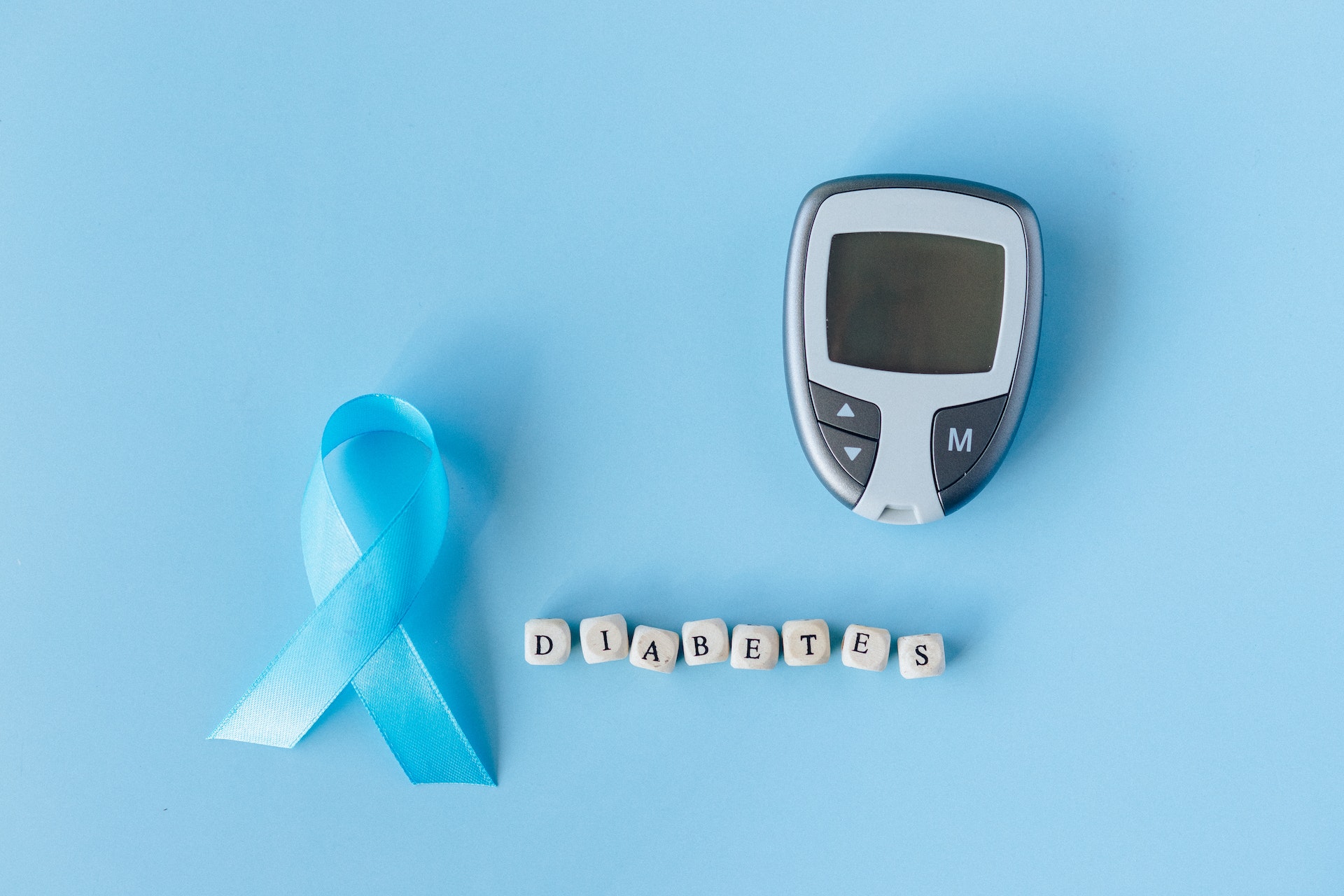Recent research has looked into the connection between chewing capabilities and its impact on blood sugar levels for patients with Type 2 Diabetes. The research uncovered an interesting link which is highly relevant for anyone with this common condition. Moreover, the research also serves as a reminder of the importance of our oral health.

Many of us take chewing for granted – with us doing this crucial activity on autopilot mode. After all, when we put food in our mouths we don’t think about chewing, it just comes naturally.
However, for some people chewing can be a difficult activity. This can make eating food challenging and cause them great discomfort. Therefore, any research that involves chewing is important, as many struggle with it.
The most recent research into the topic has investigated the link between chewing and Type 2 Diabetes – which is a common condition [1]. This research is relevant to many people.
What is Diabetes?
Diabetes is a condition that causes a person’s blood sugar to become too high [2]. The most common type of diabetes is Type 2, which is characterized by the body not producing enough insulin [2].
Approximately 38million Americans have diabetes [3]. There has been a surge in cases in recent decades, which has been linked to a more sugary diet being typical.
Diabetes is closely linked to oral health. For example, research has found that people with diabetes are more prone to tooth decay due to the condition causing a reduction in the strength of enamel [4].
Research into chewing
Recent research has found a link between poor chewing and high blood sugar levels in those with Type 2 diabetes. The research was carried out by a team from the University at Buffalo. Then their findings were published in the PLOS ONE journal [1].
The study involved 94 participants [1]. These participants were patients that had Type 2 diabetes and visited an outpatient clinic in Istanbul, Turkey.
So that the researchers could capture a wide picture, the patients selected a range of participants. Furthermore, there were a range of differences amongst the participants including weight, medications, body mass index and gender [1].
For the basis of the study, the patients were divided into two groups. One group had a strong “occlusal function” – which is having enough teeth to chew well. But the other group had a poor occlusal function and therefore struggled to chew well [1].
The blood sugar levels of the two groups were taken. The blood sugar level of the group with good chewing capabilities was 7.48%. However, for those with poor chewing capabilities, their blood sugar level was 9.42% – almost 2% higher [1].
Overall, the study overall found that patients with Type 2 diabetes that have full chewing function have a blood sugar level that is lower than patients who struggle with chewing [1].
The impact on oral health
While a 2% percentage difference may seem minimal, when put into context this is a severe issue. Just a 1% increase in blood sugar level has been connected to a 40% increase in heart disease mortality among those with Type 2 diabetes [5]. Furthermore, kidney disease and eye damage are other common problems.
The researchers pointed out that these findings have implications for oral health. Lead author Mehmet A. Eskan has said his “special clinical interest is to treat dental patients who are systemically compromised” [5].
Using this passion, Eskan’s research has strengthened the link between oral health and Type 2 diabetes. Moreover, Eskan has summarized this by stating the findings “show there is a strong association” between chewing and “controlling blood glucose levels among Type 2 diabetes patients” [5].
Eskan has urged clinicians treating people with Type 2 diabetes to check the teeth of their patients [5]. Because of past research conducted by Eskan, he has affirmed that better chewing capabilities result in an improved chance of coping better with Type 2 diabetes.
These findings should hopefully make a difference to both oral health and physical health. For those with diabetes, it will remind them of the importance of their oral health. Meanwhile, it also reminds us all to look after our oral health as it can help to improve our overall physical health.
Thinking Points
[1] If you have diabetes this article will have definitely been of interest to you. An important area that is mentioned above is the importance of oral health, as there is a strong link between these two areas. Therefore, if you do have diabetes, remember to ensure that you take extra care with your oral health. You may wish to speak to your both your dentist and doctor about these findings to see if they can make any recommendations.
[2] Whether you have diabetes or not, the importance of oral health cannot be emphasised enough. Remember to look after your teeth and eat healthily. A great way of strengthening your oral health is to attend regular dental appointments with your dentist. This will allow a dentist to examine your mouth and provide detailed information on your oral health. We recommend booking an appointment now!
What we offer at Taradale Dental
Taradale Dental is a Calgary dental clinic that provide its patients with a wide range of dental treatment options and advice aimed at improving their oral health.
It is very important to have excellent oral hygiene. This involves brushing your teeth at least twice a day, flossing regularly and eating healthily. Therefore, this should help your oral health.
We advise our patients to attend our Calgary dental clinic at least twice per year for a regular dental check-up. At these check-ups, we provide a comprehensive review of a patient’s oral health. If any problems are detected, we have many treatments available. For example, these include cavity fillings and root canals.
Here at Taradale Dental, we also have some cosmetic treatments available! These include dental implants, teeth whitening and Invisalign™! Many people find that these treatments have a positive impact on their appearance, confidence and self-esteem.
Moreover, all of our services at our Calgary dental clinic Taradale Dental are set in line with the Alberta Dental Fee Guide. This ensures transparent and fair pricing.
We hope to see you soon at our Taradale Dental clinic in Calgary! You can find out more about us by visiting our website https://taradaledental.ca.
References
[1] Bayram, Y. E., & Eskan, M. A. (2023). Mastication inefficiency due to diminished or lack of occlusal support is associated with increased blood glucose levels in patients with type 2 diabetes. PLOS ONE. 18 (4): e0284319. DOI: https://doi.org/10.1371/journal.pone.0284319.
[2] NHS. (2023). Diabetes. Available: https://www.nhs.uk/conditions/diabetes/. Last accessed: 13th May 2023.
[3] Centers for Disease Control and Prevention. (2022). The Facts, Stats, and Impacts of Diabetes. Available: https://www.cdc.gov/diabetes/library/spotlights/diabetes-facts-stats.html. Last accessed: 13th May 2023.
[4] Saghiri, M. A., Sheibani, N., Kawai, T., Nath, D., Dadvand, S., Amini, S. B., Vakhnovetsky, J., & Morgano, S. M. (2022). Diabetes negatively affects tooth enamel and dentine microhardness: An in-vivo study. Archives of Oral Biology. 139 (105434). DOI: https://doi.org/10.1016/j.archoralbio.2022.105434.
[5] The University at Buffalo. (2023). The Ability to Chew Properly May Improve Blood Sugar Levels in Patients with Type 2 Diabetes. Available: https://www.oralhealthgroup.com/news/the-ability-to-chew-properly-may-improve-blood-sugar-levels-in-patients-with-type-2-diabetes-1003973421/. Last accessed: 13th May 2023.



[…] Recent Research Has Looked Into the Connection Between Chewing Capabilities and Its Impact on Blood Sugar Levels for Patients With Type 2 Diabetes […]